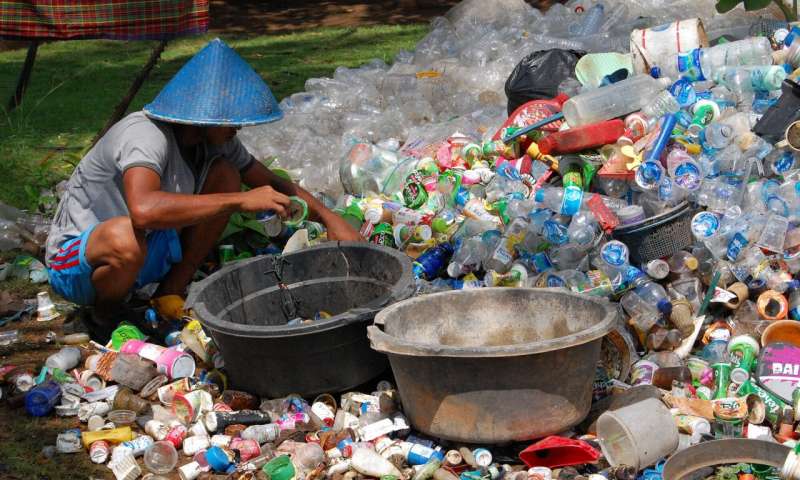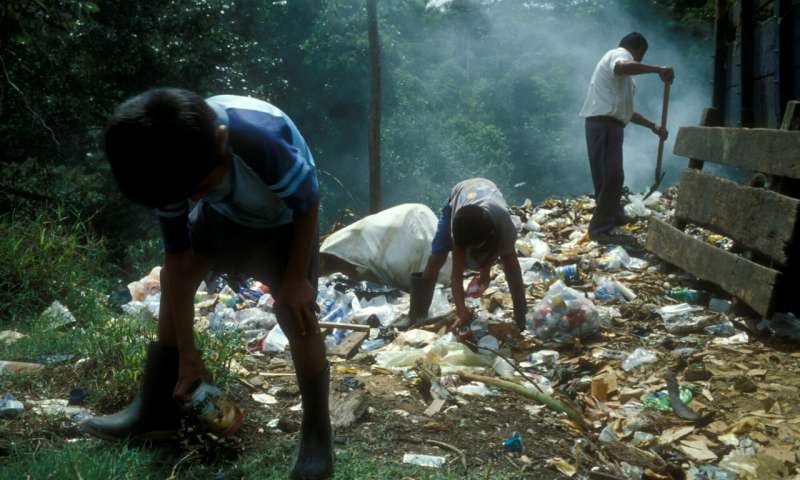Polluter pays—promoting best practice among plastic producers

I've moved around quite a lot, and one thing that's always really difficult to get my head round when I move to a new place is what I can and can't put in my recycling bin. In one place, plastic had to be put out separately; in another, glass wasn't collected at all; in yet another, cardboard couldn't be put in with paper. Unsurprisingly however, it turns out that feeling vexed because your local authority won't collect your soya milk Tetra Paks for recycling is very much a #FirstWorldProblem.
Across the world, a staggering three billion people have no access to proper waste management, of which two billion have no access to waste collection. In these countries, plastic pollution is not only affecting the health of marine ecosystems and species (as well as the livelihoods of those who depend upon them), but is also having grave consequences for human health. Plastic waste is dumped and often openly burned, resulting in the release of toxic chemicals and increased air pollution. Plastic dumpsites also provide ideal breeding grounds for disease-carrying mosquitoes, rats and flies. The prevalence of plastic packaging in these countries is increasing at an alarming rate.
As discussed in last month's blog on plastics alternatives, whilst Fauna & Flora International (FFI) doesn't believe that going 100% plastic-free is the right approach, we do believe that globally we need to be using much less plastic, and that the plastic we do produce should be valued, reused and recycled as much as possible. We also believe that it's the producers of plastic products and packaging that bear primary responsibility for mitigating its negative impacts on the environment.
Around the world there are plenty of examples of companies taking steps in the right direction, which is really encouraging to see. PETCO in South Africa is encouraging greater recycling rates of PET (polyethylene terephthalate) bottles by providing incentives for recyclers, paid for by companies like Coca-Cola, Diageo and Unilever as well as the companies that produce and convert the plastic used to create the bottles. In many European countries, deposit return schemes (whereby consumers pay a small deposit when purchasing certain items, which is refunded when they return the packaging for recycling) are normal practice and partially funded by the producers of the products covered. These are both examples of Extended Producer Responsibility (EPR) schemes, so called because they extend the responsibility that a producer has for a product beyond the point of purchase to encompass a larger part of the product's life cycle.
At FFI we want to see companies embrace EPR schemes not only for the end of a product's life, but across its entire life cycle to encompass issues such as product design, and spillage of pre-production pellets, also known as nurdles (which if not addressed will continue to contribute to chronic microplastic leakage into the marine environment from otherwise closed-loop systems). We particularly want to see multinationals introduce these schemes into those low- and middle-income countries most affected by plastic pollution and whose governments are least well-placed to address it.

That's why we've come together with the development NGOs Tearfund, WasteAid and the Institute of Development Studies to call on multinational consumer goods companies, and the high-income country governments that have supported throwaway lifestyles, to take more responsibility for averting the plastic pollution crisis in developing countries. We've published a joint position paper, which outlines the disproportionate impacts that plastic pollution is having on environmental and human health in low-income countries, and our recommendations for action.
At FFI, we'll be following this up by asking companies to:
- Report on, and commit to reducing, the number of single-use plastic items sold through adoption of innovative re-use and refill schemes;
- Be proactive in trialling and introducing EPR schemes so that one item is collected for each one sold;
- Report on the plastic pollution created across the entire value chain of their products, and publish plans for how they will minimise this without resorting to alternatives that may be just as bad for nature (for example, as part of the NGO Forest Coalition FFI is encouraging companies to report on their goals towards zero deforestation);
- Innovate to increase the cost-effectiveness and scalability of recycling systems;
- Develop realistic indicators to measure the success of these interventions in terms of reduced impacts on marine ecosystems.
We also want high-income country governments to minimise the amount of plastic waste they are exporting to low-income countries, both to boost the recycling sector in their own countries and also to lessen the burden on those countries least able to accommodate it. In addition, we'd like to see high-income country governments follow the UK's lead by introducing fiscal measures such as the proposed tax on plastic packaging containing less than 30% recycled content. We hope that corporates will support and encourage schemes like this both in the UK and around the world, as a means of increasing the value of recyclate and thus making circular economies more financially viable.
Whilst we may not be advocating giving up plastic entirely this Easter period, we hope that through constructive engagement with corporates, policymakers and our partners across the world we can work together to reduce the threat that plastic pollution poses not just to the health of the oceans, but to the health of the planet's poorest people.
More information: Tackling Plastic Waste and Pollution for Human Health and Marine Biodiversity – a Call for Global Action. live-fauna-flora-international … ine_Biodiversity.pdf
Provided by Fauna & Flora International




















